Partners in Mission: Building Bridges across our Jesuit University Network
BY MARCUS MESCHER | August 10, 2020
It’s one thing to read or write about solidarity, but another thing entirely to experience it. I got a taste of solidarity after my first time participating in the Ignatian Family Teach-In for Justice; after that weekend, I knew I had to visit El Salvador. And after my visit to El Salvador—standing where the UCA martyrs were killed, hearing the stories of resilience and hope from people like Sister Peggy O’Neill, and being moved by the cariño and confianza (the affection, warmth, and sacred trust) of the Salvadoran people—I knew that this is where I had to return. And so, when I was asked to describe the “dream course” I’d like to teach when I interviewed for my job as a professor of Christian ethics, I described a theology of solidarity that would read the work of Óscar Romero, Ignacio Ellacuría, S.J., Dean Brackley, S.J., and Jon Sobrino, S.J., over the first half of the course, travel to El Salvador over spring break, and then spend the second half of the semester exploring how to integrate this experience into our daily life and relationships, share the stories we heard, and invite other people into the work of solidarity.
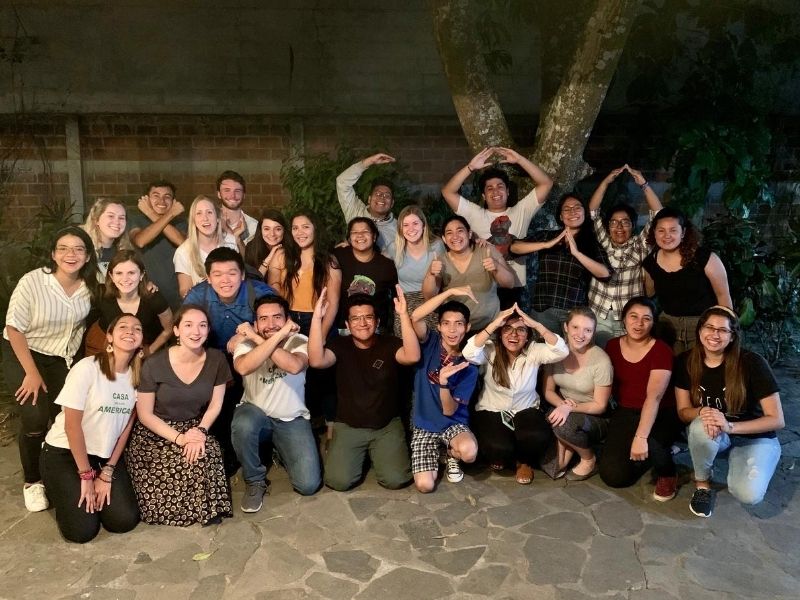
Xavier University and Centro Ignacio Ellacuría students.
This past semester, this dream came true. Nine students and I spent a week with the Centro Ignacio Ellacuría (CIE) at the UCA, the Jesuit University of El Salvador. The CIE is named after the president of the university who was murdered (along with five of his fellow Jesuits, their housekeeper, and her daughter) by U.S.-trained soldiers on November 16, 1989. The CIE welcomes college students to combine their course of study with a semester-long commitment to accompanying the members of a rural community. Their motto is inspired by St. Ignatius of Loyola: “We enter to learn, we leave to serve.”
The CIE students were our hosts and had a major impact on us. Drew Schlidt, a graduate of Marquette University High School, in Milwaukee, WI and sophomore marketing major shared that “my time in El Salvador helped me to realize the interconnectedness of the Xavier and UCA student bodies, both in our humanity and our Jesuit ideals. I hope that as the forces of globalization and technological development shape our world, Jesuit institutions will continue to engage in collaborative efforts like this one in pursuit of a greater sense of solidarity and mission.”
We had an unforgettable experience in El Salvador. We heard heart-breaking stories of unthinkable trauma. Every day, we were put in touch with the wounds people carry, but not in a way that was overwhelming or paralyzing or defeating, because it was always through inclusivity, respect, affection, trust, and interdependence. Emma Brandt, a senior Economics, Sustainability and Society major, observes, “This experience helped me realize that being Jesuit educated includes a call to action. We can say that we are men and women for and with others as much as we want, but until we put those words into practice, they do not present their full meaning. It is by being immersed and active outside of our normal routine and perspective that we enact the values of our education.”
In lieu of a final exam, my students worked on an advocacy project so that we were not just changed by this experience, but became agents of change, as well. They partnered with the CIE students to share what our time together taught us about the demands of solidarity and the costliness of Jesuit education:
In addition to their efforts on Instagram to raise awareness of the social reality facing the people of El Salvador today, these students worked hard to be bridge-builders as advocates and allies in the work of accompaniment, education, and empowerment. They created a website that connects us through the power of sharing stories and raising our voice for the marginalized. Annie Boyd-Ramirez, a friend of mine from our days together at Marquette University and a 2018 recipient of ISN’s Moira Erin O’Donnell Emerging Leader for Justice Award, helped us focus especially on efforts to educate and empower women (often pushed to the peripheries of social, economic, and political power) through Programa Velasco.
These connections—between Marquette, Xavier, and the UCA—help us live up to the vision for Jesuit education that Ignacio Ellacuría described: to become more aware of reality so that we can take responsibility for transforming it. And, in the process, we are transformed, as well. We are not only partners in mission as people who are all Jesuit educated, or collaborators in a number of the Jesuits’ universal apostolic preferences; we are agents of solidarity and signs of hope that we can heal bonds broken by personal and social sin: fear and greed, insecurity and indifference, exclusion and unjust inequality. When we move from spectators to stakeholders, we celebrate the gifts we have to offer and put them to work in meeting the needs of the world. When we share in this work together, we expand opportunities to learn, grow, and create change. And we are reminders to each other to never settle for anything less than what God makes possible in and through us.
Marcus Mescher is associate professor of Christian ethics at Xavier University in Cincinnati, OH. He is a four-time Jesuit school graduate (Marquette University High School, Marquette University, Boston College School of Theology and Ministry, and Boston College). His book, The Ethics of Encounter, exploring how to build the “culture of encounter” championed by Pope Francis in an American context, was published by Orbis Books in 2020.

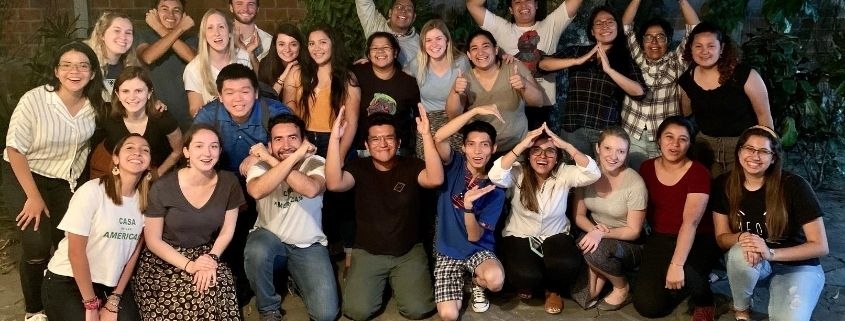
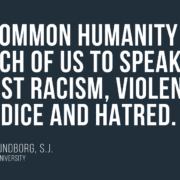

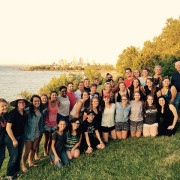


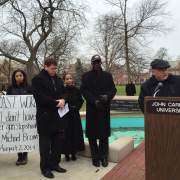

Wishing the bridge-builders strength and stamina. God bless.
I can just about remember this happening at the time I didn’t really understand that much cause I was very young but learnt about it more later on in life on how a country could be so corrupt, xenophobic towards Spanish and use soldiers for there evil. But I kind of understood why a percentage of people had these thoughts but it still does not condone there actions, but today El Salvador the people are very welcoming and friendly in most places and this is a great country to give the students a chance to learn and gain new experiences which will help them more. God Bless the hard work and the future aswell has remembering those that past.